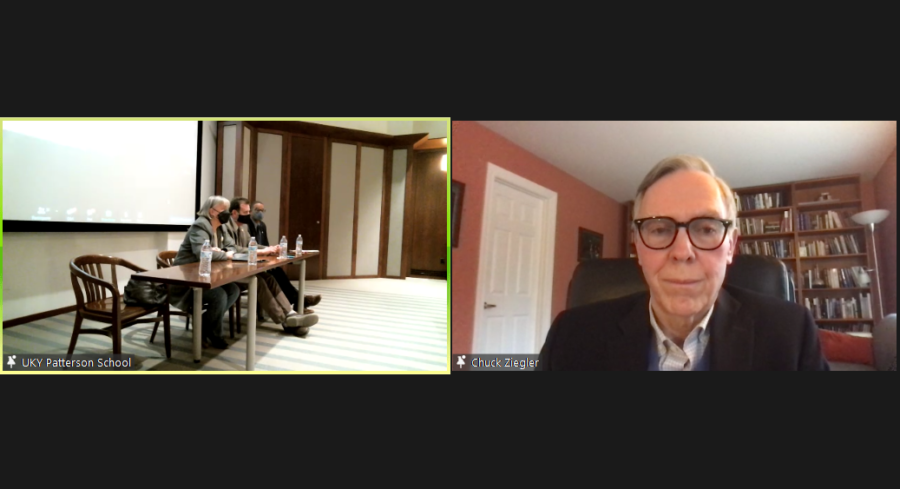UK Patterson School of Diplomacy discusses Russia-Ukraine crisis
Screenshot taken during Russia-Ukraine crisis discussion hosted by the Patterson School Diplomacy on Wednesday, Feb. 9, 2022.
February 10, 2022
On Wednesday, Feb. 9, UK hosted a talk aimed at explaining current political and military tensions in Russia and Ukraine to the campus community.
Titled “How Could This Happen? Explaining the Russia-Ukraine Crisis,” the talk was a collaboration between UK’s Patterson School of Diplomacy and International Commerce and its Russian studies program. The goal of the talk, according to Gregory Hall, a presenter and associate professor in the Patterson School, was to provide more perspective to the current crisis to observers across the Atlantic.
Jeanmarie Rouhier-Willoughby, a professor of Russian studies, began the discussion by detailing how legends contributed to the crisis. She discussed urban legends in Russia about supposed U.S. anti-Russian actions, including the U.S. creating AIDS to send to Russia, the U.S. attempting to control poppy crops in Afghanistan in order to get Russians addicted to heroin and the U.S. sending contaminated chicken as food aid.
“This may seem extreme … [but] this reveals a Russia that is really concerned about what America does … and a Russia that is afraid of being weak,” she said. “They see America as potentially a manipulator because they are seeing themselves to be weak.”
Rouhier-Willoughby explained that Ukraine is experiencing the same fear, holding the same legends of sabotage and subtle action on the part of Russia and Vladimir Putin. She said these legends are exacerbated by pro-Ukrainian nationalism and Ukrainian government policies such as the 1989 decision to make Ukrainian, not Russian, the official language of Ukraine.
“Each holds the other as holding the cards, to some extent,” Rouhier-Willoughby said.
Robert Farley, a professor in the Patterson School, then discussed Russia’s military action in Europe, including deploying troops to the Russia-Ukraine border in what Farley described as a “World War II-style mechanized offensive.”
“Russia is acting like a country that wants to invade its neighbor,” Farley said.
Farley also brought up the possibility that this movement is just a bluff on Russia’s part intended more as a message to NATO, citing the difficulty of invading Ukraine by land in the spring due to the muddy terrain.
“It is not pleasant for anyone to fight along the Ukranian-Russian border in February,” Farley said. “If something’s going to happen, it’s going to happen before the middle of March.”
Farley also recalled his personal confusion as to whether or not Russia would actually mobilize troops into Ukraine.
“I was as skeptical as anyone else that there was going to be a war … The consequences of a war at this point are really quite severe,” he said. “That doesn’t mean we won’t see a war.”
Chuck Ziegler, a professor of political science at the University of Louisville, also spoke on the panel. Ziegler, who attended the talk via Zoom, discussed political motivations to Russia’s possible action, including Georgia and Ukraine attempting to become members of NATO.
“Certainly this issue of NATO membership … is a red line for the Kremlin,” Ziegler said.
Ziegler also gave more background to Russia’s involvement with other neighboring countries, discussing how Russia has collaborated politically with both Kazakhstan and China. In recent months, Russia and Kazakhstan have conducted joint anti-militant troop exercises and signed a military cooperation agreement.
“Kazakhstan has been very close to the United States … but they are closer to Russia,” Ziegler said. “By this intervention, Russia demonstrated that they can be a security guarantor for the region.”
In regard to China, Ziegler described Russian President Vladimir Putin’s meeting with Chinese President Xi Jinping on Friday, Feb. 4, and how this could affect potential military action.
“I don’t think that Putin will make any moves while the Olympics is going on,” Ziegler said. “Mr. Putin would not want to give a black eye to his Chinese supporters.”
Hall said at the end of the talk that any additional questions about the conflict can be emailed to gregory.hall24@uky.edu.


























































































































































